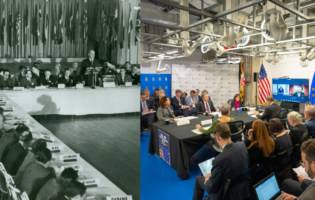
A Journey of a Thousand Miles Begins with a Single Step: A Chinese Way of Leadership, U.S. and Germany Must Take Note

Yixiang Xu
China Fellow; Program Officer, Geoeconomics
Yixiang Xu is the China Fellow and Program Officer, Geoeconomics at AGI, leading the Institute’s work on U.S. and German relations with China. He has written extensively on Sino-EU and Sino-German relations, transatlantic cooperation on China policy, Sino-U.S. great power competition, China's Belt-and-Road Initiative and its implications for Germany and the U.S., Chinese engagement in Central and Eastern Europe, foreign investment screening, EU and U.S. strategies for global infrastructure investment, 5G supply chain and infrastructure security, and the future of Artificial Intelligence. His written contributions have been published by institutes including The Chinese Academy of Social Sciences, The United States Institute of Peace, and The Asia Society's Center for U.S.-China Relations. He has spoken on China's role in transatlantic relations at various seminars and international conferences in China, Germany, and the U.S.
Mr. Xu received his MA in International Political Economy from The Josef Korbel School of International Studies at The University of Denver and his BA in Linguistics and Classics from The University of Pittsburgh. He is an alumnus of the Bucerius Summer School on Global Governance, the Global Bridges European-American Young Leaders Conference, and the Brussels Forum's Young Professionals Summit. Mr. Xu also studied in China, Germany, Israel, Italy, and the UK and speaks Mandarin Chinese, German, and Russian.
__
The highly anticipated first meeting between Donald Trump and China’s president Xi Jinping concluded quietly against the backdrop of U.S. missile strikes in Syria. Despite flawlessly choreographed appearances and mutually-assured friendship, the Chinese and U.S. leadership face huge gaps on issues such as trade and regional security. On North Korea, aside from vague reassurance of broad international cooperation, the two sides failed to reach agreement for a specific package deal on that country’s progressing nuclear development. On the trade front, Trump’s campaign promise to end unfair Chinese trade practice and bring jobs back to America was quickly humbled by the complexity of mutual interests and a lack of clear strategy. In the coming days, the jointly announced 100-day plan, designed to rebalance Sino-U.S. trade and improve economic cooperation, will test how the new cordial relationship between Trump and Xi could translate into deals.
Yet both sides hailed the meeting as a great success. Trump claimed that he will have a “very, very great relationship” with his Chinese counterpart. The People’s Daily, the official media outlet of the Chinese Communist Party, called the icebreaker meeting as significant as Nixon’s rapprochement with China and Deng Xiaoping’s 1979 visit to the United States. Perhaps Xi’s gift to Trump best illustrates this new appreciation of partnership and cooperation after Trump’s intense China bashing during his election campaign and earlier skirmishes on decades-old U.S. China policy. The gift, a Chinese calligraphy scroll, iterates a well-known Chinese proverb—“A journey of a thousand miles begins with a single step.” It summarizes the current Chinese approach to dealing with a potentially volatile Trump administration on key areas of its foreign policy: one step at a time and try to find common ground even when there has been none.
Beijing’s offer of cooperation in good faith presents a great opportunity for what millions of Trump supporters have hoped for: good deals negotiated by a self-proclaimed savvy businessman. Regardless of the Chinese government’s strategic positions on issues ranging from the South China Sea to North Korea, Xi has accomplished exactly what he set out to do at Mar-a-Lago: to project an image of a strong, responsible leader who’s in control of the Sino-U.S. agenda over a still unpredictable U.S. president and his administration. Aside from the political dividend of the successful U.S. trip for Xi at the upcoming 19th Chinese Communist Party Congress, the summit’s amicable conclusion thrusts forward the perspective of assertive Chinese leadership while the world waits to see where Trump’s “America First” pledge will take the United States. At the best of the times, for Germany, and for Europe, it means holding their breath as the U.S. administration settles in and repeatedly accentuating the importance of the transatlantic partnership and their shared values. At the worst, if Trump pushes ahead with a nativist, nationalist agenda, they could find themselves on the opposite side from Washington, having to fight for their agenda. And Beijing knows this could be China’s moment of reckoning for its long-aspired-to leadership role.
Even before the German chancellor headed to Washington in March, Angela Merkel pledged over the phone with Xi her commitment to fighting for free trade and open markets with China. Trump’s chief trade advisor Peter Navarro’s sharp accusation as well as threats of high tariffs on the German auto industry from the president himself have greatly alarmed Germany. Export-oriented and with big surpluses like China, Germany’s economy is vulnerable to disruptive trade policies. In an era when the United States has become the wild card in global trade, Germany has to seek heavy-weight allies who could nudge the Trump administration away from nationalist, protectionist trade policies. And China is the perfect partner in that mission.
At Mar-a-Lago, Xi already gave Trump a crash course on the complexity and interdependence of the Chinese and U.S. economies. Deterrence of collateral damage to U.S. companies and allure of more Chinese investment drove home China’s appeal to Trump—the only way to make a good deal is to work with your partner. Having unilaterally pulled out of the Trans-Pacific Partnership (TPP) and vowed to renegotiate the North American Free Trade Agreement (NAFTA), Trump is now presented with a reality check for his promised belligerent trade shakeup.
With an American president looking to turn the tide on globalization and free trade, Beijing’s initiatives to expand its economic footprint increasingly look like responsible leadership. The death of the Trans-Pacific Partnership by U.S. withdrawal didn’t erase the demand for extensive regional free trade agreement in Asia Pacific. It merely left a leadership vacuum, which gave China a golden opportunity to push for the Regional Comprehensive Economic Partnership (RCEP) and the Free Trade Area for the Asia Pacific Region (FTAAP), both of which would enhance China’s bilateral trade and investment ties with member states, many of whom, like Japan and Australia, are long-term U.S. allies. For Germany and Europe, at least on the issue of trade and investment, a closer partnership with a predictable China will be crucial in the time of uncertainty. China’s One-Belt-One-Road Initiative (OBOR) has the potential to open new markets for European companies in Central Asia and the Middle East through infrastructure investment of regional economic integration. Business practices aside, Chinese investment in African economies could help to persuade would-be migrants to remain home, thus easing the pressure on Europe’s southern border. Growing Chinese portfolios in volatile regions from Afghanistan to the horn of Africa could push Beijing to become more assertive in conflict resolution.
That is not to say that U.S. leadership is a thing of the past or that Europe needs to move on to an alliance with China. The pragmatic approach China takes in its bilateral negotiations meets Europe’s need to minimize risks. But this Chinese pragmatism is rooted in careful geopolitical considerations, not inherent convictions of values or principles. Beijing’s reluctance to pressure North Korea as well as its bilateral approach to deal with individual EU member states reflect that sense of strategic priority. Europe needs certainty and reassurance. With rising populism across the continent, Europe’s ability to translate its deep-seated democratic values and principles in international affairs relies on strong U.S. support. U.S. missile strikes on Syria sent a clear signal that the United States is still committed to its values. China took away a lesson that raw interests are not the only cards on the table. While shared values and principles seem so passé in the age of “America First,” they are what differentiates the transatlantic relationship from China’s pragmatic alliance building. The transatlantic partners support each other even during the toughest times and they empower each other to do the right thing. Right now, that is what Germany and Europe need to hear from Trump and is what it takes to reclaim America’s leadership.







